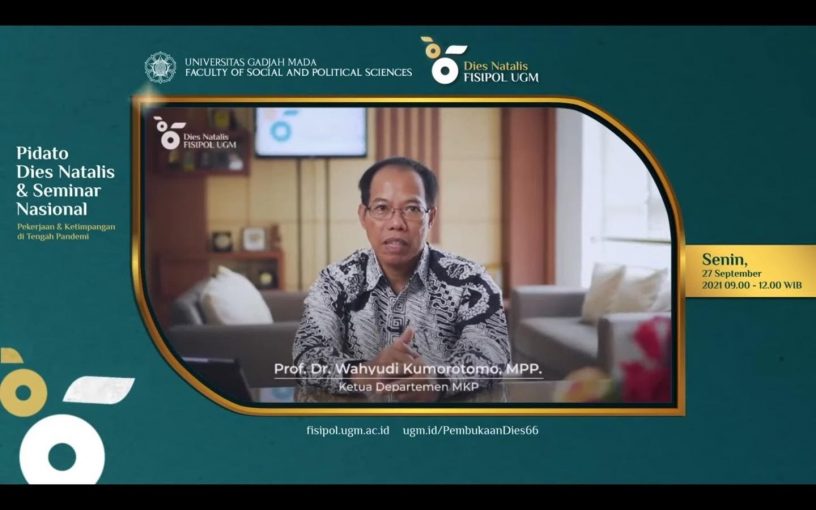
Yogyakarta, September 27th 2021─Still under the theme of FISIPOL UGM 66th Dies Natalis, the speech and national dies natalis seminar with the theme of “Job and Inequality in the Midst of the Pandemic” was held on Monday (27/9) morning. The speech was given by Prof. Wahyudi Kumorotomo, M.P.P., as a lecturer in the Department of Management and Public Policy FISIPOL UGM. Meanwhile, the speaker for the national seminar was Prof. Dr. Susetiawan, S.U., Dr. Zulfan Tadjoeddin, Nining Elitos, and Dr. Fachru Nofrian Bakarudin. The event was attended by lecturers and FISIPOL UGM members through Zoom and was live streamed through FISIPOL UGM’S Youtube.
In his speech, Wahyudi talked about jobs, vulnerability, and economic inequality in Indonesia, especially during the pandemic. As can be seen, Indonesia’s economy is dominated by small and micro businesses as an income source for the citizens. During the pandemic, 30 million small business owners have to close shop. On the other hand, formal laborers are also in a tight spot. Many are fired by the company and most of the laborers’ work normative rights and health and job safety rights are violated. “Based on the survey that we do on laborers in the Jabodetabek area, the 2021 LBH report in Jakarta shows that there are normative rights violation like a cut in the wages, suspension without pay, the change of work status from permanent worker to contract based worker, and also the annihilation of labour union,” said Wahyudi.
In reply to the Dies Natalis speech, during the national seminar Susetiawan said that even before the pandemic Indonesia already had problems concerning jobs and economic inequality. In the 1980s, there was an economic dualism where the formal and informal economy worked in tandem with each other but there was no connection between them. “The development of the informal economic sector as a safety net for the formal economy is the ideal. However, both the formal and informal economy encounter several problems, especially when it comes to industrial relations. If we talk about decent work in Indonesia, I believe that the formal or informal sector is far from the word decent,” she said.

Zulfan Tadjoeddin said that the -2,1% economic growth of Indonesia is actually not bad. The dominant domestic economy factor is one of the contributors to Indonesia’s resilience that is hit by the global financial crisis. Indonesia’s agriculture and economy can be a buffer in the face of a crisis. Zulfan argues that Indonesia has learnt from its experience in the 1998 economic crisis to respond towards the economic effect of the Covid-19 pandemic and so far it is pretty appropriate and reasonable. However, it is important to increase the role of the domestic economy consistently. “On the one hand we need to reach the international market, but the domestic economy also needs to be more dynamic and it should reach the outer areas. We also need to have a stronger inter-area economic interaction. Economic rulers and agriculture should also be paid attention to Indonesia’s development in the future,” he said.
